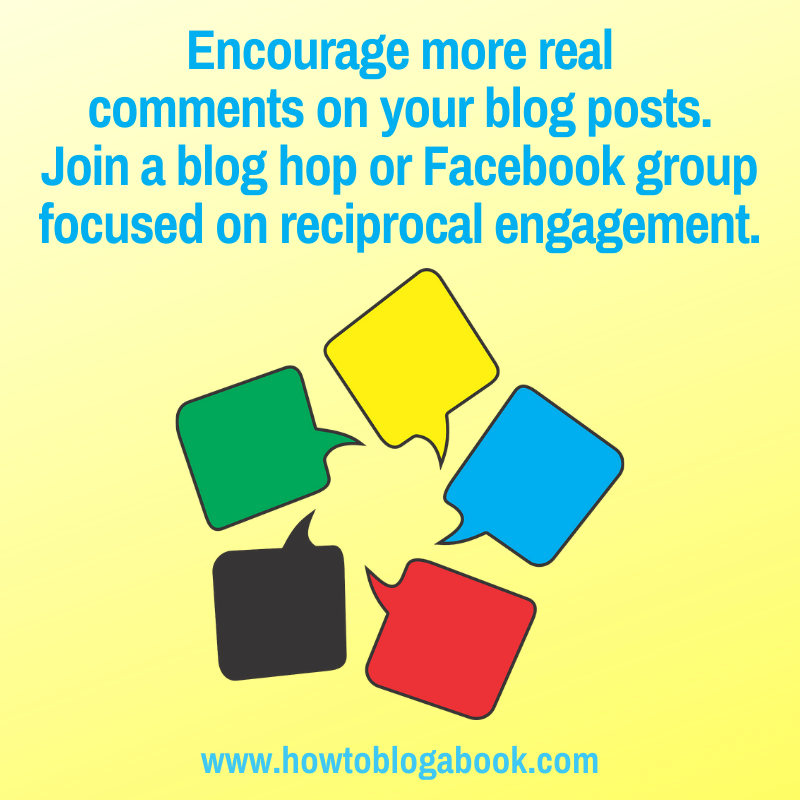Blog comments are social proof that your posts get read, and you can get authentic comments without paying for them. I run multiple websites and have tried different techniques to attract meaningful comments on my posts. Two strategies have proved the most successful: blog hops and Facebook groups.
What is a Blog Hop?
Blog hops are online networking events. Groups of bloggers within the same niche write a blog hop post each week or month. On the day of the blog hop, you visit other articles in the hop and leave a comment. Your comments are reciprocated by the other participants.
A blog hop is a commitment. Each one usually requires participants to take part in each event. If you miss two events, you’re removed from the list. So before you start, make sure you’re ready for this level of effort.
Here are a couple of blog hops specifically for writers:
Author Tool Box is held every 3rd Wednesday
- No writing prompts; just posts with guidelines.
- Visit and comment on at least eight other blogs in the hop.
Insecure Writers Support Group is held each 1st Wednesday
- A writing prompt, usually in the form of a question; you don’t have to answer the question, just use it to generate your ideas.
- Visit and comment on at least 12 other blogs in the hop.
Blog hops help you create valuable connections with people in your niche. It’s a networking opportunity that provides support and encouragement as you continue to build your online presence and brand.
To find blog hops within your niche, type “blog hops”+“your niche” in your internet search bar. If you’re writing within a popular niche, like Mommy Bloggers, you’ll have your pick of blog hops. If you’re in a smaller niche and can’t find a blog hop in the search results, you can start hosting your own hop or jump over to Facebook and search for a blog commenting group.
Facebook Community Groups
Within my travel writing niche, multiple Facebook groups exist whose sole purpose is to help promote each other’s content. Group members post links to their blog posts, and other members promote or interact with their content. Some groups host specific weekly threads for Facebook, Instagram, and Pinterest shares and blog commenting threads.
These are the same as blog hops. You post a link to your post, and other members comment on your article. In return, you leave a comment on their blog posts.
Community Group Requirements
Search for a group of peers within your niche. Look for the requirements around the quality and length of the comments. For example, one of my groups expects a minimum of 20 words per comment. Another asks for a minimum of three sentences.
Both stipulate that you write a “meaningful” comment. This is open to loose interpretation, but it means that the comment must relate to the content. To do that successfully, the commenter has to read your article. These Facebook groups are self-regulated, and bloggers call each other out if somebody leaves an unrelated or short comment.
I’ve been participating in these Facebook groups since the beginning of the year. The more you put in, the more you get out of this activity. When I read articles in full, I’m able to write a meaningful and quality comment, and people within the thread recognize this. As a result, that’s what I get back in return.
More than Blog Comments
I went into this blog commenting activity as a way to get more comments on my posts. I know that’s very self-serving, but all bloggers need to find ways to increase engagement. My efforts resulted in more than increased numbers of comments, though.
I ended up part of a network of travel bloggers who support each other. We share each other’s content on social media. And we’ve signed up to each other’s mailing lists, downloaded giveaways, and PDFs, and promoted members’ products and services.
I didn’t set out to get this result. Still, when you start collaborating with authors you enjoy reading and admire, these added benefits come as a natural progression.
Commenting has Other Benefits
When you leave a comment on another person’s blog, you can include a link to your website. It’s best to leave a post-specific link on a similar topic rather than a generic link to your blog’s home page, or your comment might be seen as spam.
These links are coded as no-follow, which means bots are directed not to crawl your site. Readers interested in the article’s content will read your comment and click through to your website. So it’s in your best interest to leave a quality comment and a link to a specific related post to entice readers to visit your website.
I’ve noticed that since I started participating in these comment-building activities, my blog traffic from different online sources has increased. So have my email sign-ups. All of this is a result of engaging in blog comments.
Have you already found a blog hop or Facebook group to help you build your audience? Leave me a link to the hop or group in the comments section below. Please share this post with your blogging network to inspire them to begin commenting and networking within their niche.
About the Author

Jay Artale abandoned her corporate career to become a digital nomad and full-time writer. She’s an avid blogger and a nonfiction author helping travel writers and travel bloggers achieve their self-publishing goals. Join her at Birds of a Feather Press where she shares tips, advice, and inspiration to writers with an independent spirit.
Photo courtesy of OpenClipart-Vectors

Amazing article, I was looking for something like this & truly feel glad to spend time on your blog. I am surely going to try these tips. Thanks for sharing.
Reading constructive comments can be of great value
Thanks Priya .. let us know what techniques and commenting tips have worked for you.
Do you currently have moles or unsightly skin tags?
Have you wanted to get rid of those annoying acnes on your skin? The Skincell Pro skin tag
eliminator is a reliable product from all natural active ingredients
designed to safely as well as rapidly remove skin tags, moles, and tarnished skin. It’s formulated to eliminate
skin moles as well as tags in as low as eight hours
flat. This powerful, quick-acting formula work quickly and swiftly,
to help you eliminate those unwanted moles without the help of doctors
or surgical treatment. https://bookmarkshut.com/story9267537/skincell-pro-official-store
Amazing article, I am going to pursue my career in social media marketing and this article is really very helpful for me. Thanks for sharing it with us.